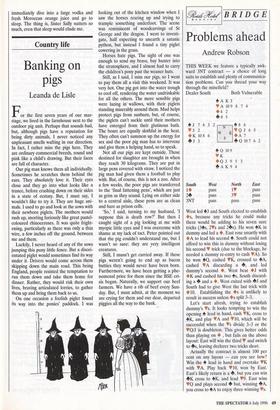Country life Banking on
pigs
Leanda de Lisle
For the first seven years of our mar- riage, we lived in the farmhouse next to the outdoor pig unit. Perhaps that sounds bad, but, although pigs have a reputation for being dirty animals, I never noticed any unpleasant smells wafting in our direction. In fact, I rather miss the pigs here. They are ordinary commercial breeds, round and pink like a child's drawing. But their faces are full of character.
Our pig man knows them all individually. Sometimes he scratches them behind the ears. They absolutely love it. Their eyes close and they go into what looks like a trance, before crashing down on their sides in a state of ecstasy. But, I must say, I wouldn't like to try it. They are huge ani- mals. I used to go and look at the sows with their newborn piglets. The mothers would rush up, snorting furiously like great pastel- coloured rhinoceroses. It was quite fright- ening, particularly as there was only a thin wire, a few inches off the ground, between me and them.
Luckily, I never heard of any of the sows jumping this puny little fence. But a disori- entated piglet would sometimes find its way under it. Drivers would come across them skipping down the main road. This being England, people resisted the temptation to run them down and take them home for dinner. Rather, they would risk their own lives, braving articulated lorries, to gather them up and bring them back to us.
On one occasion a foolish piglet found its way into the ponies' paddock. I was looking out of the kitchen window when I saw the horses rearing up and trying to trample something underfoot. The scene was reminiscent of woodcarvings of St George and the dragon. I went to investi- gate, half expecting to unearth a satanic python, but instead I found a tiny piglet cowering in the grass.
Horses hate pigs. The sight of one was enough to send my brave, bay hunter into the stratosphere, and I almost had to carry the children's pony past the weaner huts.
Still, as I said, I miss our pigs, so I went to pay them all a visit this weekend. It was very hot. One pig got into the water trough to cool off, rendering the water undrinkable for all the others. The more sensible pigs were lazing in' wallows, with their piglets standing miserably around them. Mud helps protect pigs from sunburn, but, of course, the piglets can't suckle until their mothers have emerged from their glutinous bath. The boars are equally slothful in the heat. They often can't summon up the energy for sex and the poor pig man has to intervene and give them a helping hand, so to speak.
Not all our pigs are kept outside. Those destined for slaughter are brought in when they reach 30 kilograms. They are put in large pens covered with straw. I noticed the pig man had given them a football to play with. But, of course, this is not a zoo. After a few weeks, the poor pigs are transferred to the 'final fattening pens', which are just as grim as they sound. Lying on either side to a central aisle, these pens are as clean and bare as prison cells.
'So,' I said, turning to my husband, 'I suppose this is death row?' But then I caught sight of a pig looking at me with myopic little eyes and I was overcome with shame at my lack of tact. Peter pointed out that the pig couldn't understand me, but I wasn't so sure: they are yery intelligent creatures.
Still, I musn't get carried away. If these pigs weren't going to end up as bacon butties they would never have been born. Furthermore, we have been getting a phe- nomenal price for them since the BSE cri- sis began. Naturally, we support our beef farmers. We have a rib of beef every Sun- day. But, I must admit, at the moment we are crying for them and our dear, departed piggies all the way to the bank..


























































 Previous page
Previous page